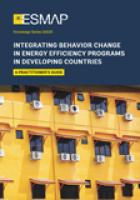Publications
Energy efficiency is among the cheapest, cleanest, and most widely available of energy resources. Improved energy efficiency provides opportunities to sustainably expand energy services and support development and economic growth, contributing to higher living standards, as well as reducing greenhouse gas emissions. In developing countries, where demand for energy is growing rapidly, the potential for energy efficiency improvements is significant, particularly in the residential sector.
The purpose of this guide is to raise awareness of behavioral approaches to achieving development outcomes, demonstrate the role that behavioral sciences can play in promoting energy efficiency, and provide guidance on how to integrate behavior change approaches into projects.
Energy Sector Management Assistance Program (ESMAP). 2020. Integrating Behavior Change in Energy Efficiency Programs in Developing Countries: A Practitioner’s Guide. ESMAP Knowledge Series;No. 029/20. World Bank, Washington, DC. © World Bank. License: CC BY 3.0 IGO.https://openknowledge.worldbank.org/handle/10986/34788




